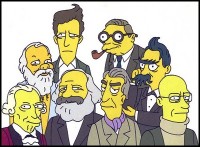PACTISS recommends

Where science meets art. The only necessary and sufficient book store in Melbourne.
Hope our friends enjoy the new look and feel – now optimised for mobile devices for access on the go.

PEOPLE
-
Coordinator: Peter Ellerton
Web guy: Jason Etheridge RESOURCE COLLECTIONS
NEW RESOURCES
-
- A nice Philosophy of Mind summary
- The power of categorical logic
- What exactly is the scientific method and why do so many people get it wrong?
- Paralympic athletes faster than olympic athletes — what does this tell us about difference?
- Logic: if + then = why? How can we understand the power of logic?
- How do we ensure we are exposed to new ideas? A parody with bite.
- A Life of Meaning (Reason Not Required) – What is the nature of our relationship with reason?
- Can you name this cognitive bias?
- By what measures can we value human life?
- Teaching philosophy improves standardised scores
- Are we in control of our own decisions?
- Neuroscience and education: myths and messages
- Free will is not as free as we think – and that’s ok.
- Where’s the Proof in Pseudoscience?
- Science in the lead?
RANDOM POSTS
-
- Kant, Immanuel (1724-1804) - Critique of Practical Reason
- Philosophy of Religion - Problem of Suffering
- If you've nothing to hide.....Secrecy and the Open Society
- International Baccalaureate Theory of Knowledge essay titles
- Science and art from Dilbert
- The Mind Body Problem
- Teaching philosophy improves standardised scores
- Ethical Dilemmas in Science
- A Utilitarian Decision - Sacrifice Lives to Save Lives
- Squashed Philosophers
USEFUL RSS FEEDS
 Philosopher’s Zone
Philosopher’s Zone NYTimes – The Stone
NYTimes – The Stone Philosophy Now
Philosophy Now RSA Animate
RSA Animate- The Green Corridors Initiative
- Governance governing government
- Why print money when we can print wealth?
- Building a resilient health and care system
- We'll always have Paris?
- Experimentation and equity in global cities
- Technology-enabled deliberative democracy
- Healthier placemaking
- Creating a sovereign wealth fund in Wolverhampton
- Economic recovery and climate action
 Scientific American – Mind and Brain
Scientific American – Mind and Brain- Kindness Can Have Unexpectedly Positive Consequences
- It's the Bass That Makes Us Boogie
- Subliminal Cues, Precisely Timed, Might Help People Forget Bad Experiences
- Severe COVID May Cause Brain Changes Similar to Aging
- Autism Treatment Shifts Away from 'Fixing' the Condition
- Fatherhood Changes Men's Brain, according to Before-and-After MRI Scans
- Many People with Bipolar Disorder Use Cannabis. It May Sometimes Help
- Why Social Media Makes People Unhappy--And Simple Ways to Fix It
- People Shopping for 'Meaning' Buy Cheaper Goods
- Pregnancy Changes the Brain, Possibly Promoting Bonding with a Baby
 TED talks
TED talks- Can the metaverse bring us closer to wildlife? | Gautam Shah
- The billion-dollar pollution solution humanity needs right now | Stacy Kauk
- Are video calls the best we can do in the age of the metaverse? | Josephine Eyre
- How great leaders take on uncertainty | Anjali Sud and Stephanie Mehta
- How Indigenous guardians protect the planet and humanity | Valérie Courtois
- How to tap into your awareness -- and why meditation is easier than you think | Yongey Mingyur Rinpoche
- Demystifying the wild world of crypto | Laura Shin
- How can we escape soaring energy bills? Stop using fossil fuels | Tessa Khan
- A disability-inclusive future of work | Ryan Gersava
- How to tackle the stigma of living with HIV | Gareth Thomas
THEMED RESOURCES
- December 2022MonTueWedThuFriSatSun282930123456789101112131415161718192021222324252627282930311
Hypothesis booklet
All about hypothesis forming, the characteristics of a good hypothesis, testing hypotheses and hypotheses in the social sciences. Lots of worksheets included.
This entry was posted in Booklets, Handouts and Worksheets, Critical Thinking, Philosophy of Science, Social and Political Philosophy. Bookmark the permalink.








